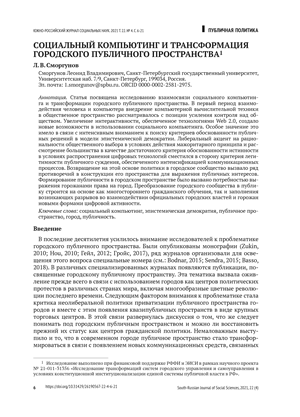Аннотация
Статья посвящена исследованию взаимосвязи социального компьютинга и трансформации городского публичного пространства. В первый период взаимодействия человека и компьютера внедрение компьютерной вычислительной техники в общественное пространство рассматривалось с позиции усиления контроля над обществом. Увеличение интерактивности, обеспеченное технологиями Web 2.0, создало новые возможности в использовании социального компьютинга. Особое значение это имело в связи с интенсивным вниманием к поиску критериев обоснованности публичных решений в модели эпистемической демократии. Либеральный акцент на рациональности общественного выбора в условиях действия мажоритарного принципа и рассмотрение большинства в качестве достаточного критерия обоснованности истинности в условиях распространения цифровых технологий сместился в сторону критерия легитимности публичного суждения, обеспеченного интенсификацией коммуникационных процессов. Возвращение на этой основе политики в городское сообщество вызвало ряд противоречий в конструкции его пространства для выражения публичных интересов. Формирование публичности в городском пространстве было вызвано потребностью выражения горожанами права на город. Преобразование городского сообщества в публику строится на основе как многостороннего гражданского обучения, так и заполнения возникающих разрывов во взаимодействии официальных городских властей и горожан новыми формами цифровой активности.
Ключевые слова
Финансирование
Исследование выполнено при финансовой поддержке РФФИ и ЭИСИ в рамках научного проекта № 21-011-31356 «Исследование трансформаций систем городского управления и самоуправления в условиях конституционной институционализации единой системы публичной власти в РФ».Библиографические ссылки
- Amin, A. (2008) Collective Culture and Urban Public Space. City, 12(1), 5–24. DOI: 10.1080/13604810801933495
- Basso, S. (2018). Rethinking Public Space Through Food Processes: Research Proposal for a “Public City”. Urbani Izziv, 29, 109–124.
- Benson, J. (2019). Knowledge and Communication in Democratic Politics: Markets, Forums and Systems. Political Studies, 67(2), 422–439.
- Bodnar, J. (2015). Reclaiming public space. Urban Studies, 52(12), 2090–2104.
- Calhoun, C. (1986). Computer Technology, Large-Scale Social Integration, and the Local Community. Urban Affairs Quarterly, 22(2), 329–349.
- Chen, J. & Liu, J. (2014) Introduction: Social Computing and Social Networks. Journal of Organizational Computing and Electronic Commerce, 24(2–3), 119–121. DOI: 10.1080/10919392.2014.896712
- Cohen, J. (1986). An Epistemic Conception of Democracy. Ethics, 97(1), 26–38.
- Danziger, J. (1986). Computing and the Political World. Computers and the Social Sciences, 2, 183–200.
- Denning, P. (2010). Computing Science: The Great Principles of Computing. American Scientist, 98(5), 369–372.
- Evans, J. (2020). Social Computing Unhinged. Journal of Social Computing, 1(1), 1–13. DOI: 10.23919/JSC.2020.0002
- Geyl, Ya. (2012). Goroda dlya lyudey [City for People]. Moskva: Al’pina Pablisher.
- Goodin, R., Spiekerman, K. (2018). An Epistemic Theory of Democracy. Oxford: Oxford University Press.
- Groys, B. E. (2017). Publichnoe prostranstvo: ot pustoty k paradoksu [Public Space: From Emptiness to Paradox]. Moskva: Strelka Press.
- Hannon, M. (2022). Are knowledgeable Voters better voters? Politics, Philosophy & Economics, 21(1), 29–54.
- Hou, J. (2010). Insurgent Public Space: Guerrilla Urbanism and the Remaking of Contemporary Cities. New York: Routledge.
- Karaliotas, L. (2020) Ronan Paddison on Public Space and the Postpolitical. Space and Polity, 24(2), 252–261. DOI: 10.1080/13562576.2020.1787136
- König, P. D. (2021). Truth Versus Ignorance in Democratic Politics: An Existentialist Perspective on the Democratic Promise of Political Freedom. Contemporary Political Theory, 20(3), 614–635. DOI: 10.1057/s41296-020-00436-y
- Lebedeva, E. V. (2016). Transformaciya publichnogo prostranstva postsovetskih gorodov [Transformation of Public Space of Postsoviet Cities]. Sociologiya [Sociology], 4, 107–115.
- Lefebvre, H. (1996). The Right to the City. In Lefebvre, H. Writings on cities. Oxford: Blackwell. Pp. 63-184.
- Mehta, V. & Bosson J. (2021). Revisiting Lively Streets: Social Interactions in Public Space. Journal of Planning Education and Research, 41(2), 160–172.
- Mihaylova, E. (2020). Slaktivizm: sovremennye IKT kak resurs formirovaniya i artikulyatsii obshchestvennogo mneniya [Slactivism: Contemporary ICT as a resourse of forming and articulation of public opinion]. Mezhdunarodnaya zhizn’ [International Life], 3, 96–105.
- Moir, S. & Crowther, J. (2017). Radicalising citizenship education. Andragoška spoznanja, 23(3), 17–34.
- Moore, A., Invernizzi-Accetti, C., Markovits, E., Pamuk, Z. & Rosenfeld, S. (2020). Beyond Populism and Technocracy: The Challenges and Limits of Democratic Epistemology. Contemporary Political Theory, 19(4), 730–752. DOI: 10.1057/s41296-020-00398-1
- Peter, F. (2007). Democratic Legitimacy and Proceduralist Social Epistemology. Politics, Philosophy & Economics, 6(3), 329–353.
- Popović, K., Maksimović, M., Jovanović, A., Joksimović, J. (2020). New Learning Sites in Learning City — Public Pedagogy and Civil Education. Andragoška spoznanja/Studies in Adult Education and Learning, 26(1), 33–51.
- Ptichnikova, G. A., Chernichkina O. V. (2019). Informacionno-tekhnologicheskaya model’ obshchestvennogo prostranstva sovremennogo goroda [Information Technology Model of Modern City Public Space]. Gradostroitel’stvo i arhitektura [Urban Planning and Architecture], 9(2), 53–60.
- Robertson, D. & Giunchiglia, F. (2013). Programming the Social Computer. Philosophical Transactions: Mathematical, Physical and Engineering Sciences, 371(1987), 1–14.
- Rosenbloom, J. & Ginther, D. (2017). The Effectiveness of Social Science Research in Addressing Societal Problems: Broadening participation in computing. Science and Public Policy, 44(2), 259–273.
- Rosenfeld, S. (2019). Democracy and Truth. A Short History. Philadelphia: University of Pennsylvania Press.
- Sabah, M., Fang, W. C., Hassanien, A. E. & Kim, T. (2021). Advanced Data Mining Tools and Methods for Social Computing. The Computer Journal, 64(3), 281–285.
- Sendra, P. (2015). Rethinking Urban Public Space. City, 19(6), 820–836. DOI: 10.1080/13604813.2015.1090184
- Shklovski, I. & Chang M. F. (2006). Guest Editors’ Introduction: Urban Computing: Navigating Space and Context. Computer, 39(9), 36–37.
- Smith, R. J. & Hetherington, K. (2013). Urban Rhythms: Mobilities, Space and Interaction in the Contemporary City. The Sociological Review, 61(S1), 4–16. DOI: 10.1111/1467-954X.12050
- Solov’ev, A. I. (2021). “Dokazatel’naya politika” i “politika dokazatel’stv”: dilemma postsovetskih obshchestv [“Evidence-Based Politics” and “Evidence Politics”: the Dilemma of Post-Soviet Societies]. Kontury global’nyh transformaciy: politika, ekonomika, pravo [Contours of Global Transformations: Politics, Economics, Law], 14(5), 61–80. DOI: 10.23932/2542-0240-2021-14-5-3
- Touraine, A. (1998). Vozvrashchenie cheloveka dejstvuyushchego. Ocherki sociologii [The Return of the Acting man. Essays in Sociology]. M.: Nauchnyy mir.
- Zhelnina, A. A. (2015). Kreativnost’ v gorode: reinterpretaciya publichnogo prostranstva [Urban Creativity: Reinterpreting the Public Space]. Zhurnal sociologii i social’noy antropologii [The Journal of Sociology and Social Anthropology], 2(78), 45–59.
- Zukin, S. (2010). Naked City: The Death and Life of Authentic Urban Places. Oxford: Oxford University Press.
 English
English


